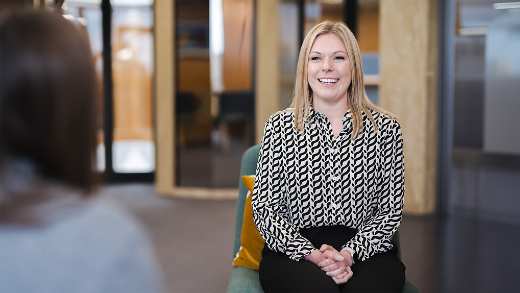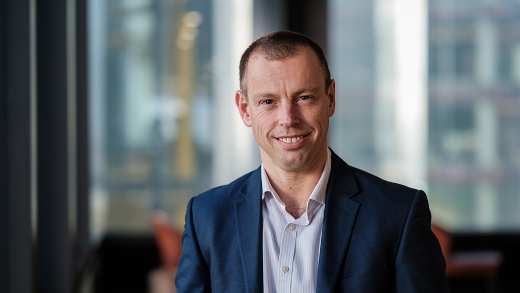Heather Dusenbury, specialist underwriter in Aviva Canada, on math, exposure and deal hunting.
Heather Dusenbury, specialist underwriter in Aviva Canada, on math, exposure and deal hunting.
Every year, Insurance Business Canada has this big black-tie awards event. I found out in the fall that I was a finalist for Underwriter of the Year, which was exciting - and even more exciting to win.
Even so, people aren’t impressed when I say I’m an underwriter. Most people don’t really understand what we do. In a nutshell, underwriters assess risk in insurance policies, then write policy terms and agree premiums that work for insurers and their customers. It’s a lot of math.
I work with brokers to insure their customers. I write commercial automobile insurance, for things like ambulances, buses, car fleets. Honesty is important. If a risk isn’t right for Aviva, or our premiums would be higher than the marketplace, I’ll always be open about that.

On huge exposure
I wrote a policy for a local municipality, a city that needed insurance for their ambulances, buses, all those types of vehicles.
Municipalities have a tonne of vehicles sitting in parking lots. And this municipality is in a part of Canada, Ontario that can get tornadoes. There was exposure right there, huge potential claims. That could be why the previous insurer didn’t offer renewal – it was too risky.
We did a lot of mapping of those risks in the event of catastrophic weather claims. I was able to agree and write policy terms that said the municipality would cover the first $10 million if a tornado went through and Aviva would cover the rest.
My broker’s head office approved it. Our legal team approved it and we shared it with the regulator to be fully transparent. In the end, we were able to provide the cover the municipality needed. They didn't have an insurance gap, and their premium was fair in their opinion.
On bus door injuries
I never apologise for asking a bunch of underwriting questions. I’m not doing it to be mean. It’s my job to make sure the risk is right on both sides, and we can support brokers when claims are made.
A lot of people write commercial auto insurance as an add-on to property or casualty insurance. But if you don't get that right, customers can miss out on a lot of coverage. Sometimes, you don’t know about it until there’s a catastrophic loss – people getting hurt or killed in accidents.
So, I ask about safety regulations, use of dashcams, and drivers’ experience, convictions and claims histories. Sometimes we look beyond drivers… Another municipality we insure, their bus doors were closing so quickly passengers couldn’t get through fast enough – the doors were closing on them. So, they changed the timers on the doors to keep passengers safe and avoid injury claims.
On the study of society
When I was younger, I wanted to be a teacher. Then I went to university and studied sociology, the study of society and consequences of human behaviour. After university, my husband - who I’ve been with 23 years now since we were 16 - went into insurance, like his father before him.

I remember him talking about all these development opportunities, and I wanted some of that. So, I took what I learned in university and applied it to insurance. Things like studying drivers’ behaviours - how they act and react - and how property values relate to a whole bunch of economic factors.
On going virtual
My department never worked from home before COVID-19. Our offices are in downtown Toronto in the financial district. We’re surrounded by large brokers and it’s important to get out and see them – for coffee or a meeting. But that all stopped in the pandemic. We went virtual.
Now I have a lot of video meetings with brokers. Not commuting makes things easier - I save three hours a day - but at the same time I miss face-to-face interaction and networking. Getting together with people, laughing, catching up about insurance and the marketplace.
On deal hunting
My colleagues downtown, they laugh at me because I'm such a big deal hunter. Deal hunter is actually on my license plate.
I'm a fan of getting dresses at a great price and I have quite the collection. Even when our office went a little more casual, a little more dress-for-your-day, that never really applied to me. Every day there would be a different dress, and my colleagues would wonder where I was going or who I was meeting. There wasn't always a meeting - it was just me, wearing my deals.
On counting blessings
I'm happy to be healthy. My husband and my family are healthy - I'm blessed for that.
As you go through your career, there are times you don’t feel rewarded or you seek challenge. The desire to strive and do better always exists. I want that for myself and my family, while counting our blessings – having a roof over our heads and appreciating the people around us.
My boss is an amazing person. I've worked for him for seven years. His patience is extraordinary and ability to decline a risk that’s not a good fit for Aviva is always so eloquent. When we're defending underwriting decisions, he's always there for me.

My husband is similar: very serious, very well-spoken. He always considers the pros and cons; he reminds me to make decisions based on facts rather than emotions.
On never knowing
People have told me – and I’m proud of this – that I’m a social chameleon. I have this ability to join groups and get to know people. I’m independent enough that I'll show up by myself, not knowing anybody. But then I’ll then leave with hopefully 10 new friends and some potential clients.
I’ll never know who nominated me for underwriter of the year. They don’t tell you. But I like to think people see my passion for what I do.
***
It takes our people to make Aviva a great place to work. For more on life at Aviva, follow us on LinkedIn, Instagram and X.

















